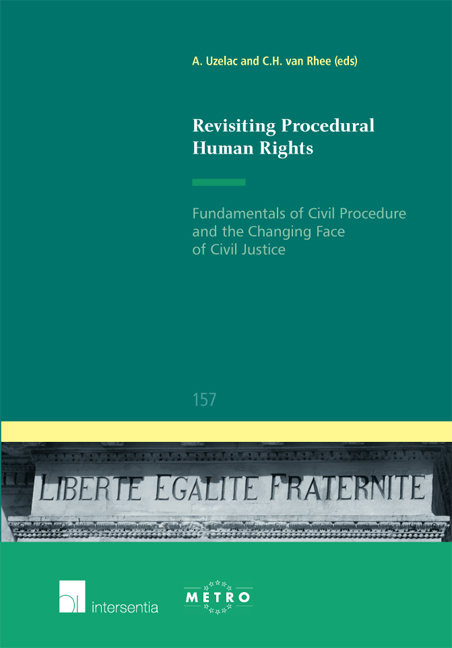 Revisiting Procedural Human Rights
Revisiting Procedural Human Rights Book contents
- Frontmatter
- Table of Contents
- List of Authors
- List of Abbreviations
- Acknowledgements
- Introduction
- The Human Right to Accessible and Foreseeable Justice
- The Inconsistency of Case Law and the Right to a Fair Trial
- Misgivings about American Exceptionalism: Court Access as a Zero-Sum Game
- Should Fair Trial Rights be Redefined? Civil Litigation as a Societal Discussion
- Fundamental Procedural Rights from a National Angle
- Wheels of History: Fair Trial Rights in Historical Perspective
- Equal Justice for all: Empirical and Normative Approaches to Legal Aid and Assistance in Civil and Administrative Cases
- Ius Commune Europaeum
The Inconsistency of Case Law and the Right to a Fair Trial
from The Human Right to Accessible and Foreseeable Justice
Published online by Cambridge University Press: 13 October 2018
- Frontmatter
- Table of Contents
- List of Authors
- List of Abbreviations
- Acknowledgements
- Introduction
- The Human Right to Accessible and Foreseeable Justice
- The Inconsistency of Case Law and the Right to a Fair Trial
- Misgivings about American Exceptionalism: Court Access as a Zero-Sum Game
- Should Fair Trial Rights be Redefined? Civil Litigation as a Societal Discussion
- Fundamental Procedural Rights from a National Angle
- Wheels of History: Fair Trial Rights in Historical Perspective
- Equal Justice for all: Empirical and Normative Approaches to Legal Aid and Assistance in Civil and Administrative Cases
- Ius Commune Europaeum
Summary
Introduction
In civil law jurisdictions case law has traditionally not been recognised as a formal source of law. In Slovenia, Article 125 of the Constitution is often invoked in this context, according to which the judges are independent and are, in their decisionmaking, bound (only) by the Constitution and laws, not by judicial decisions reached in other similar cases. The same follows also from Article 11 of the Courts Act, which explicitly provides that a court is not bound by the legal positions of another court. On the other hand, it is acknowledged in legal writing that case law plays a co-creative role at least. It is argued that application of the law must be consistent and uniform, and that in a state governed by the rule of law we justifiably expect to be treated as others are treated and that we can rely on previous decisions in comparable cases. Therefore, courts must consider the ‘argument from precedent’, as one of the interpretative arguments, when they decide cases and reason their judgments. Although falling short of formally recognising the binding nature of precedents, the practical importance of case law is thus firmly recognised in modern civil law jurisdictions. Quite indicative is Opinion No. 11 (2008) of the Consultative Council of European Judges (CCJE) on the quality of judicial decisions, which stipulates that ‘in civil law countries, they [judges] will be guided by case law, especially that of the highest courts, whose task includes ensuring the uniformity of case law’ (para. 48). This statement can be perceived as an expression of generally accepted standards.
On the legislative level, a very powerful recognition of the importance and relevance of case law in Slovenia was achieved through the reform of the system of access to the supreme court, implemented in 2008 (which was discussed in an earlier volume in this series). The introduction of the ‘leave to appeal system’ emphasised the public function of the decision-making of a supreme court, which consists in safeguarding and promoting the uniformity of case law, the development of law and offering guidance to lower courts, thus ensuring predictability in the application of the law. The introduction of these criteria for granting leave to appeal implies that the Court's resolution of the matter will generally be accepted beyond the scope of the individual case.
- Type
- Chapter
- Information
- Revisiting Procedural Human RightsFundamentals of Civil Procedure and the Changing Face of Civil Justice, pp. 17 - 52Publisher: IntersentiaPrint publication year: 2017
- 3
- Cited by


